National Democratic Party of Germany
| Nationaldemokratische Partei Deutschlands |
|
|---|---|
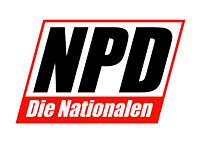 |
|
| Leader | Udo Voigt |
| Founded | 28 November 1964 |
| Headquarters | Berlin |
| Political Ideology | Pan-Germanism White nationalism, Third position |
| International Affiliation | |
| European Affiliation | none |
| European Parliament Group | none |
| Colours | Black, White, Red |
| Website | http://www.npd.de/ |
| See also | Politics of Germany Political parties |
The National Democratic Party of Germany (German: Nationaldemokratische Partei Deutschlands, NPD) is a German pan-German nationalist and white nationalist political party. The party, founded on 28 November 1964, is a successor to the German Reich Party (German: Deutsche Reichspartei, DRP). Udo Voigt has led the party since 1996.
An ARD-led poll states that the majority of the population in Germany considers the NPD to be undemocratic and damaging to the image of the country. [1] The NPD is viewed by its opponents and the mainstream media as a de facto National Socialist organization for various reasons, particularly because the party opposes the increasing number of non-whites, Jews, and Muslims living in Germany.
The German federal intelligence agency Verfassungsschutz classifies the NPD as a "threat to the constitutional order" because of its platform and philosophy. The party is under observation by the Verfassungsschutz.
Contents |
Platform and philosophies
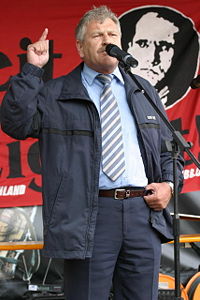
The NPD's political philosophy coincides with the notion of a third political position, an idea which developed amidst criticisms of both liberal capitalism and communism. The NPD also endorses certain beliefs about human nature. NPD leader Udo Voigt states that the philosophy of the NPD differs from both communism and social liberalism in that it acknowledges people as unequal products of their societies and environments, largely governed by what is called natural law. Voigt states that the party is also influenced by the views of modern sociologists such as Konrad Lorenz and Irenäus Eibl-Eibesfeldt. The NPD calls itself a party of "grandparents and grandchildren" because the 1960s generation in Germany, known for the leftist student movement, seldom supports the NPD's policies. The NPD's economic program promotes social security for Germans and control against plutocracy, but the party does not oppose private property. Voigt has demanded the "dismantling" of the "liberal-capitalist system". [2]
| This article is part of the Neo-fascism series. 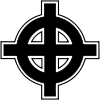 This series is linked to the Politics and Elections series |
|
Definition Varieties of Neo-fascism Neo-Nazism Origins of Neo-fascism Clerical fascism Alleged neo-fascist parties and movements American Nazi Party Related Subjects Far right |
| Fascism Portal |
The primary feature of the NPD that its opponents classify as extremism is its social orientation and philosophy. [3] This includes a desire to dissolve a bureaucracy or constitution if it interferes with the ability of the Volk to preserve their traditions and continued existence. [4] Voigt called the current German political system illegitimate, and said: "It is our goal to handle (abzuwickeln) the Federal Republic of Germany, just as 15 years ago the people handled the German Democratic Republic." [5]
The NPD argues that NATO fails to represent the interests and needs of European people. The party considers the European Union to be little more than a reorganisation of Europe along financial lines. [6] Although highly critical of the EU, as long as Germany remains a part of it, the NPD opposes Turkey's incorporation into the organisation. Voigt envisions future collaboration and continued friendly relations with other nationalists and European national parties.

The party's platform says that Germany is larger than the present-day Federal Republic, and calls for revision of the post-war border acknowledgements. [7] A map of Germany on the party's website omits the border that divides Germany from Austria and leaves out the Oder-Neisse Line, which established the limits of federal Germany to the east and was agreed upon with Poland in 1990. [8] While this suggests a desire to renegotiate the status of historical eastern Germany, it may be a populist effort to capitalise on the bitter sentiments of Germans expelled from these regions (especially Silesia, Pomerania, Danzig, and East Prussia). The 2005 report of the Verfassungsschutz federal agency contains the following description:
"The party continues to pursue a "people's front" of the nationals [consisting of] the NPD, DVU, and forces not attached to any party, which is supposed to develop into a base for an encompassing "German people's movement". The aggressive agitation of the NPD unabashedly aims towards the abolition of parliamentary democracy and the democratic constitutional state, although the use of violence is currently still officially rejected for tactical reasons. Statements of the NPD document an essential affinity with National Socialism; its agitation is racist, antisemitic, revisionist, and intends to disparage the democratic and lawful order of the constitution." [9]
Statements on the election of Barack Obama
In November 2008, th NDP wrote that the election of Barack Obama as the first African-American President of the United States was the result of "the American alliance of Jews and Negroes" in a document entitled "Africa conquers the White House." The NDP also stated that the extensive support for Obama in Germany "resembles an African tropical disease" and that Obama aimed to destroy the United States' "white identity." The NDP claimed that "A non-white America is a declaration of war on all people who believe an organically grown social order based on language and culture, history and heritage to be the essence of humanity" and that "Barack Obama hides this declaration of war behind his pushy sunshine smile."[10][11][12][13]
International connections
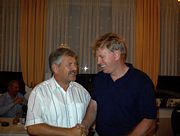
Voigt has held meetings with various white nationalist proponents, such as American politician David Duke.[14] In a recent speech, Udo Pastörs made it clear that the NPD is supportive of Russia and the Russian point of view in the 2008 South Ossetia War.[15]
History
At the time of the NPD's founding in 1964, its opponents attempted to have the NPD declared a direct successor to the Nazi Party, and thereby disbanded in accordance with West German law. The party has never won the minimum 5% of votes in German federal elections that allow a party to send delegates to the German Parliament, but it was represented in several state parliaments in the 1960s and has recently repeated this feat.
In the 2004 state election in Saxony, the NPD won 9.2% of the overall vote. The NPD currently sends 12 representatives to the Saxony state parliament, the Landtag. During the 2004 election, the NPD entered a non-competition agreement with the German People's Union (DVU) and has since maintained that only one of the two parties will compete in any given election. The third white nationalist-oriented party, the Republicans (REP), has so far refused to join this agreement. However, Kerstin Lorenz, a local representative of the Republicans in Saxony, sabotaged her party's registration to help the NPD in the Saxony election.
In the 2005 federal elections, the NPD received 1.6 percent of the vote nationally. It garnered the highest percent of votes in the states of Saxony (4.9 percent), Thuringia (3.7 percent), Mecklenburg-Vorpommern (3.5 percent) and Brandenburg (3.2 percent). In most other states, the party won around 1 percent of the total votes cast. In the 2006 Mecklenburg-Vorpommern state election, the NPD received 7.3% of the vote and thus achieved state representation there, as well. [16]
The NPD had 5,300 registered party members in 2004. [17] Over the course of 2006, the NPD processed roughly 1,000 party applications to put the membership total at 7,000. The DVU has 8,500 members. [18]
The 2003 banning attempt
In 2003, the federal government, the Bundestag, and the Bundesrat jointly attempted to ban the NPD in a trial before the Federal Constitutional Court, the Bundesverfassungsgericht, the highest court in Germany with the exclusive power to ban parties if they are found to be "anti-constitutional". However, the case was thrown out when it was discovered that a large percentage of the NPD's inner circle were in fact undercover agents or informants of the German secret services, like the federal Bundesamt für Verfassungsschutz. They include a former deputy chairman of the party and author of an anti-Semitic tract that formed a central part of the government's case. A number of other intelligence services' agents remain undetected. Since the government assemblies were unwilling to fully disclose their agents' identities and activities, the court found it impossible to decide which moves by the party were based on genuine party decisions and which were controlled by the secret services in an attempt to further the ban. "The party was, in part, responding to the government's dictates," the court said. "The presence of the state at the leadership level makes influence on its aims and activities unavoidable," it concluded. [19]
Horst Mahler (NPD), a former member of the far left terrorist organisation Red Army Faction, defended the NPD before the court. Former chancellor Gerhard Schröder has suggested that the government should try to place a ban on the party again, but others did not see why it would be any more successful than the previous failed attempt.
World War II and Holocaust memory controversies
On 21 January 2005, during a silence in the Saxon state assembly in Dresden to mark the 60th anniversary of the liberation of the Nazi Auschwitz extermination camp, twelve members of the NPD walked out in protest. The NPD was upset that a moment of silence was being held for those who died in the Auschwitz camp and that none was being given for those who died during the bombing of Dresden in World War II, with the anniversary of both events falling relatively close to each other. Holger Apfel, leader of the NPD in Saxony and deputy leader of the party nationwide, made a speech in the Saxon State Parliament in which he called the Allied forces of the United States of America and Britain "mass murderers" because of their role in the bombing. His colleague, Jürgen Gansel went on to describe the bombing itself as a "holocaust of bombs".
Voigt voiced his support and reiterated the statement, which some controversially claimed was a violation of the German law which forbids Holocaust denial. However, after judicial review, it was decided that Udo Voigt's description of the 1945 RAF bombing of Dresden as a holocaust was an exercise of free speech and "defamation of the dead" was not the purpose of his statement.[20]
Alleged intimidation attempts
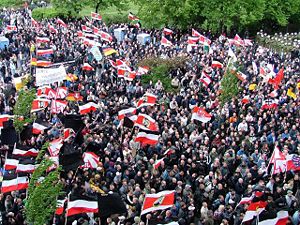
The NPD has come under criticism for allegedly exerting party influence by means of "intimidation", creating "national, free zones" in areas where their support is the strongest. This tactic is seen by some as an attempt by the NPD to circumvent their marginal electoral status. [21] The party utilised this strategy to prevent a self-declared anti-fascist concert by musician Konstantin Wecker in Halberstadt, Saxony-Anhalt; vowing to buy out the tickets and put NPD supporters in attendance at that March 2006 show.
NPD supporters had planned to march around the city of Leipzig on 21 June 2006 in support of the Iranian national football team at the 2006 World Cup match held in the city. Although they intended to show their support of Iranian president Mahmoud Ahmadinejad, the NPD cancelled its sponsorship of the event upon further review, and no supportive demonstration took place; only a counter-demonstration in support of Israel actually took place in the city. [22] During the World Cup, the party's web site complained that due to the prevalence of people of non-German descent on the German national football team, the team "was not really German".
Party leaders of Germany
- Friedrich Thielen 1964-1967
- Adolf von Thadden 1967-1971
- Martin Mussgnug 1971-1990
- Günter Deckert 1991-1996
- Udo Voigt 1996-present
See also
- Politics of Germany
- List of political parties in Germany
- Frank Rennicke
Notes
- ↑ [1] Poll where Germans were asked whether they thought the NPD was "undemocratic" or "damaging to the image of Germany"
- ↑ Annual Report of the Office for the Protection of the Constitution 2004, p. 56.
- ↑ Overview of the theoretical political spectrum [2]
- ↑ See: Party Platform of the NPD (PDF)
- ↑ Junge Freiheit: Interview with Udo Voigt, chairman of the NPD (German) [3]
- ↑ NPD party programme (in German) http://npd.de/medien/pdf/parteiprogramm.pdf
- ↑ Party program, p. 13. ("Deutschland ist größer als die Bundesrepublik! ... Wir fordern die Revision der nach dem Krieg abgeschlossenen Grenzanerkennungsverträge.")
- ↑ Map of Germany on NPD's website http://www.npd.de
- ↑ Report of the Versfassungsschutz [4]
- ↑ German pol decries ‘Jewish-Negro’ alliance, Jewish Telegraphic Agency (JTA), November 11, 2008 (retrieved on December 5, 2008.)
- ↑ Jewish group mulls charges over neo-Nazi Obama slurs, BreitBart.com, November 10, 2008.
- ↑ Calls for prosecution after German politician says Obama win 'a declaration of war' by Jon Swaine, Telegraph.co.uk, November 11, 2008.
- ↑ Racism Rears Its Head in European Remarks on Obama by Craig Whitlock, Washington Post, page A15, November 11, 2008 (retrieved on December 5, 2008.)
- ↑ David Duke. "My Awakening: A Path to Racial Understanding". Free Speech Press. Retrieved on 2007-09-17.
- ↑ NPD Meck. Pom. [5]
- ↑ BBC News update [6]
- ↑ Spiegel [7]
- ↑ IRNA [8]
- ↑ German court rejects attempt to ban neo-Nazi party | The Guardian | Guardian Unlimited
- ↑ Hannah Cleaver, "German ruling says Dresden was a holocaust", Telegraph.co.uk, April 12, 2005.
- ↑ Deutsche Welle article [9]
- ↑ BBC News article [10]
External links
- NPD web site (German)
- Party Platform of the NPD (PDF) (German)
- History of the National Democratic Party (English)
- Critical documentation of the NPD in the local Parliament of the German state of Saxony (German) (English)
- BBC news: Poll boost for German far right (English)
|
||||||||
|
|||||||||||